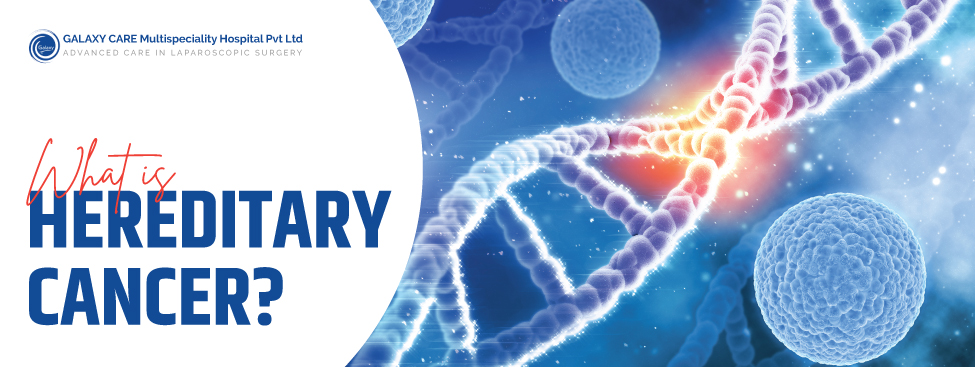
What is Hereditary Cancer? | Galaxy Care Hospital
Cancer is a complex disease that can be influenced by a variety of factors, including genetics. Hereditary cancer, also known as inherited cancer, is a type of cancer that is passed down from generation to generation within a family. This type of cancer is caused by specific genetic mutations that are present in an individual’s DNA from birth. Understanding the concept of hereditary cancer is crucial for individuals and their families, as it can help with early detection, prevention, and management of the disease.
Understanding Hereditary Cancer
Hereditary cancer is caused by genetic mutations that are passed down from parents to their children. These mutations can be inherited from either one or both parents and can increase an individual’s risk of developing certain types of cancer. The most common types of hereditary cancers include breast cancer, ovarian cancer, colorectal cancer, and prostate cancer, among others.
The inheritance pattern of hereditary cancer can vary depending on the specific genetic mutation involved. Some hereditary cancers are inherited in an autosomal dominant pattern, which means that a single copy of the mutated gene is enough to increase the risk of developing the disease. Other hereditary cancers, such as those caused by recessive mutations, require two copies of the mutated gene that lead to an increased risk.
Identifying Hereditary Cancer
Identifying hereditary cancer is crucial for individuals and their families, as it can help with early detection, prevention, and management of the disease. Several factors can indicate the presence of hereditary cancer, including:
Family History
A strong family history of cancer can be an indicator of hereditary cancer. This is because genetic mutations that increase cancer risk can be passed down from generation to generation within a family. Individuals with a close relative (parent, sibling, or child) who has been diagnosed with cancer may have an elevated risk of developing the same or related types of cancer themselves. Recognizing this family history is crucial for early detection, prevention, and management of hereditary cancer.
Genetic Testing
Genetic testing is a powerful tool for identifying the presence of genetic mutations associated with hereditary cancer. By analyzing a person’s DNA, genetic tests can detect specific genetic changes that are known to increase the risk of certain types of cancer. This information can guide oncologists in developing personalized screening and prevention strategies for individuals at high genetic risk. Genetic testing is an important step in understanding and managing hereditary cancer.
Early Onset of Cancer
Hereditary cancers often develop at a younger age compared to non-hereditary cancers. If an individual is diagnosed with cancer at an earlier age than is typically expected for that type of cancer, it may be an indication of an underlying genetic component. This early onset of cancer can be a valuable clue in identifying the possibility of hereditary cancer, which can then lead to further evaluation, genetic testing, and the implementation of appropriate screening and prevention measures.
Multiple Primary Cancers
Individuals with hereditary cancer may develop multiple primary cancers, either in the same organ or in different organs. This pattern of multiple cancer diagnoses can be a sign that the cancer is linked to an underlying genetic mutation. The development of multiple primary cancers, rather than a single cancer, can be an important indicator that the cancer may have a hereditary component, prompting further investigation and management strategies.
Early Diagnosis and Prevention of Hereditary Cancers
Early detection and prevention are crucial for people with a history of hereditary cancer. By identifying the presence of genetic mutations that increase cancer risk, these individuals can take proactive steps to monitor their health and reduce their chances of developing cancer. Regular, comprehensive screening is a cornerstone of effective early detection. Mammograms, colonoscopies, and other targeted tests can help catch cancers in their earliest, most treatable stages, when the chances of successful intervention and recovery are highest.
In addition to screening, preventive measures can also play a vital role. For some individuals, prophylactic surgery to remove high-risk tissues may be recommended, while others may benefit from chemoprevention – the use of medications to lower cancer risk. These preventive strategies can significantly reduce the likelihood of cancer development, empowering individuals to take control of their health and minimize the impact of their hereditary predisposition. By embracing early detection and prevention, those with a family history of hereditary cancer can improve their long-term prognosis and quality of life.
Conclusion
Hereditary cancer is a complex and challenging disease, but with increased awareness, early detection, and effective management strategies, individuals and their families can take steps to reduce their risk and improve their health outcomes. By understanding the genetic factors that contribute to hereditary cancer, seeking genetic counselling, and implementing appropriate screening and preventive measures, individuals can take an active role in managing their health and reducing the impact of this disease.
At Galaxy Care Hospital, the Best Cancer Hospital in Pune, we are committed to providing comprehensive and personalized care for individuals with hereditary cancer. Our team of experienced oncologists, oncosurgeons and other healthcare professionals work together to develop tailored treatment and management plans that address the unique needs of each patient. With our state-of-the-art facilities, advanced diagnostic tools, and innovative treatment approaches, we are dedicated to helping our patients navigate the complexities of hereditary cancer and achieve the best possible health outcomes.
If you or a loved one have a history of hereditary cancer or are concerned about your genetic risk, we encourage you to reach out to our team at Galaxy Care Hospital in Pune. We are here to help you understand your options, access the care and support you need, and empower you to take control of your health from day one!


